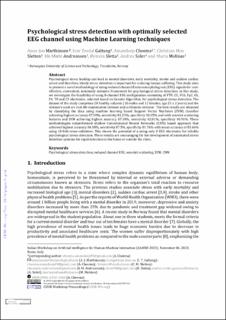Psychological stress detection with optimally selected EEG channel using Machine Learning techniques
Marthinsen, Anne Jo; Galtung, Ivar; Cheema, Amandeep; Sletten, Christian; Andreassen, Ida Marie; Sletta, Øystein; Soler, Andres; Molinas Cabrera, Maria Marta
Peer reviewed, Journal article
Published version
Permanent lenke
https://hdl.handle.net/11250/3121066Utgivelsesdato
2023Metadata
Vis full innførselSamlinger
Originalversjon
CEUR Workshop Proceedings. 2023, 53-68.Sammendrag
Psychological stress buildup can lead to mental disorders, early mortality, stroke and sudden cardiac arrest and therefore, timely stress detection is important for reducing human suffering. This study aims to present a novel methodology of using reduced channel Electroencephalogram (EEG) signals for cost-effective, convenient, minimally intrusive framework for psychological stress detection. In this study, we investigate the feasibility of using 8-channel EEG configuration consisting of FT9, O1, FC6, Fp2, Oz, F4, T8 and C3 electrodes, selected based on Genetic Algorithm, for psychological stress detection. The dataset of the study comprises 28 healthy subjects (16 males and 12 females, age 23 ± 2 years) and the stressors used are real-life examination stressor and arithmetic stressor. The best results are obtained by classifying the data using machine learning based Support Vector Machines (SVM) classifier achieving highest accuracy 87.50%, sensitivity 81.25%, specificity 92.05% and with wavelet scattering features and SVM achieving highest accuracy 87.50%, sensitivity 82.81%, specificity 90.91%. These methodologies outperformed shallow Convolutional Neural Networks (CNN) based approach that 83.66% using 10-fold cross-validation. This shows the potential of a using only 8 EEG electrodes for reliable psychological stress detection. These results are encouraging for the development of automated stress detection systems for rapid detection in the home or outside the clinic.

